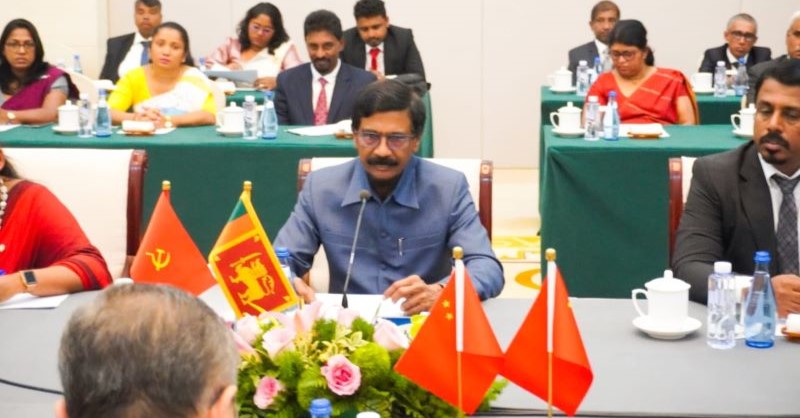
(Lanka-e-News -04.Aug.2025, 11.00 PM) In a powerful statement from Beijing, Tilvin Silva, General Secretary of the Janatha Vimukthi Peramuna (JVP), declared that Sri Lanka must strive to become a nation where people no longer live in fear of tomorrow. Speaking during an educational visit to China on the invitation of the Chinese Communist Party, Silva stressed that the country should transform into a society where the lives of all citizens are secure, stable, and filled with hope.
While Sri Lanka’s National People’s Power (NPP) government embarks on its reformist agenda, this timely visit and Silva’s remarks have sparked serious conversations on what Sri Lanka could learn—if not emulate—from the Chinese development trajectory. With 29 delegates in tow, the NPP leadership was exposed to the inner workings of China's economic, social, and infrastructural transformation—an experience they describe as both humbling and inspiring.
“China’s achievements are not abstract slogans; they are concrete realities,” Silva noted. “From rural upliftment to industrial growth, and from education to health, the country has delivered measurable progress for its people.”
China’s success story is rooted in a long-term national vision, technocratic governance, and a resolute focus on eradicating poverty. The NPP, which rose to power on a platform of structural reform, social justice, and anti-corruption, is now facing the monumental task of delivering tangible change to a deeply cynical population. The Chinese model offers a compelling case study—not necessarily to copy wholesale, but to adapt intelligently.
Unlike previous Sri Lankan regimes that often sought short-term popularity through populist subsidies and mega projects marred by corruption, the Chinese model places strategic importance on planning, production, and state accountability. Local governments are empowered but held to rigorous performance metrics. Education and technology are not political slogans but cornerstones of national competitiveness.
Critics argue that China’s political system—authoritarian, centralised, and party-controlled—is fundamentally incompatible with Sri Lanka’s democratic norms. But supporters of the NPP point out that it is not about copying China’s political machinery, but about understanding the principles behind its policy execution: discipline, meritocracy, and long-term strategy.
China’s commitment to rural revitalisation, export-led industrialisation, and digital transformation offer a practical blueprint for nations like Sri Lanka, which continue to grapple with an outdated bureaucracy, political nepotism, and unsustainable debt.
Already, signs of this pragmatic shift are visible within the NPP’s early policy moves. Budget proposals have leaned towards infrastructure renewal with a rural lens. There is renewed emphasis on primary healthcare, vocational education, and green energy. Most importantly, for the first time in decades, economic policy is being discussed in public forums with numbers and logic—not just rhetoric.
For the NPP, the challenge is not merely to survive in power, but to govern in a way that restores faith in state institutions. If Sri Lanka is to follow the Chinese example, it must do so with open eyes and a clear conscience. The aim should not be to replicate Beijing’s political system, but to internalise its determination to uplift the majority—especially the marginalised.
As Tilvin Silva said, “A country where people no longer fear tomorrow is not built overnight. But it begins with leadership that has the courage to learn, and the will to act.”
In that sense, perhaps the greatest lesson from China is not about skyscrapers, highways, or bullet trains—but about vision. And that is precisely what Sri Lanka has long lacked.
---------------------------
by (2025-08-04 18:53:59)
Leave a Reply